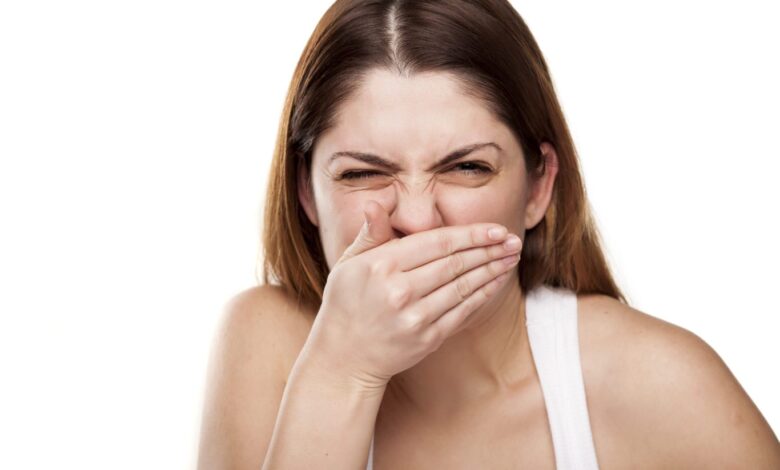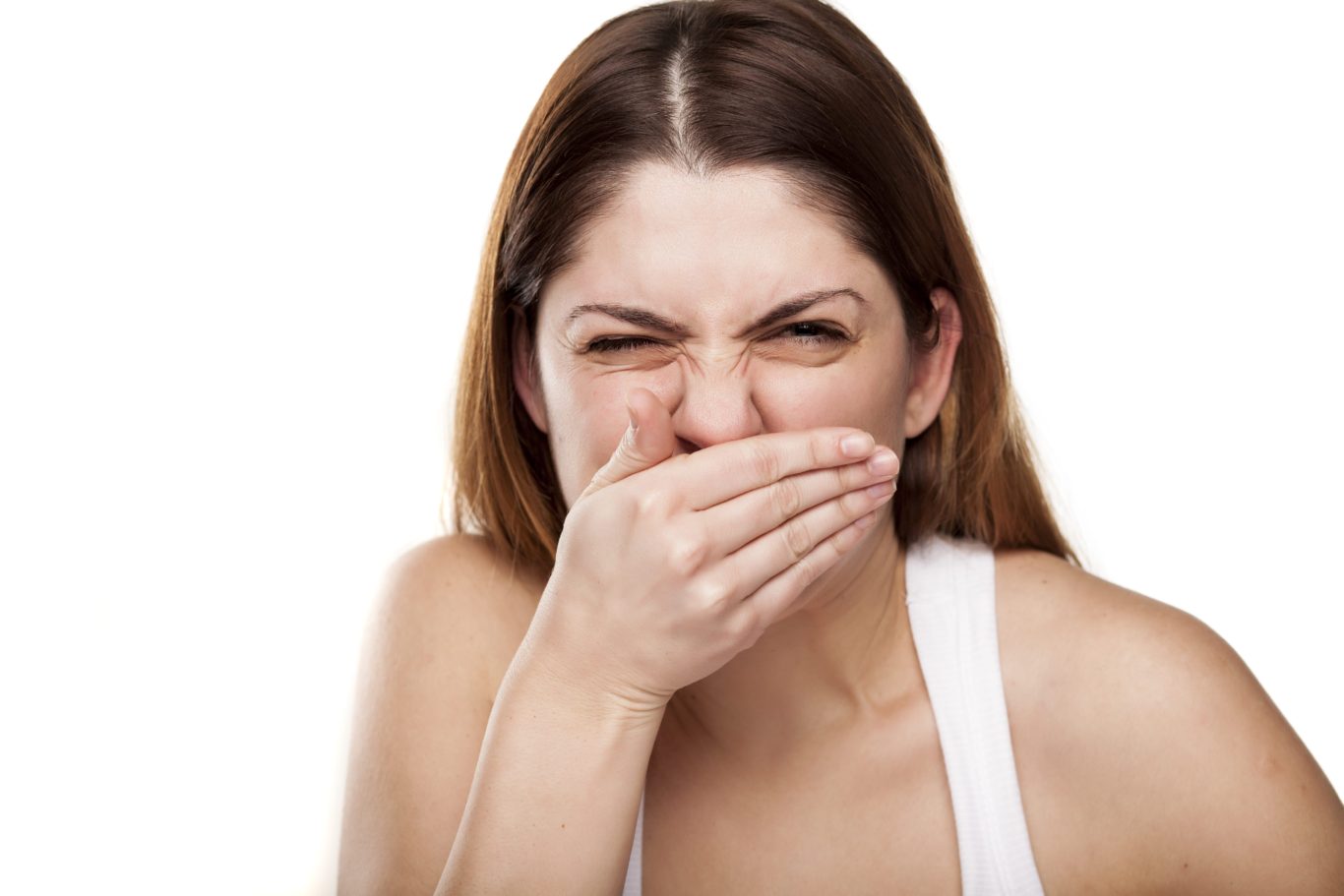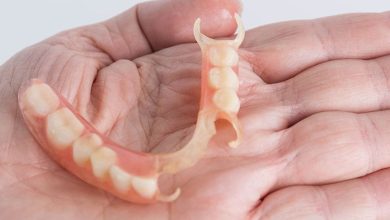
 Bad breath, medically called halitosis, can result from poor dental health habits and may be a sign of other health problems. Bad breath can also be made worse by the types of foods you eat and other unhealthy lifestyle habits.
Bad breath, medically called halitosis, can result from poor dental health habits and may be a sign of other health problems. Bad breath can also be made worse by the types of foods you eat and other unhealthy lifestyle habits.
Table of Contents
Can What You Eat Affect The breath?
Why Do Poor Habits Cause Bad Breath?
If you don’t brush and floss teeth daily, food particles can remain in your mouth, promoting bacterial growth between teeth, around the gums, and on the tongue. This causes bad breath. Antibacterial mouth rinses also can help reduce bacteria.
In addition, odor-causing bacteria and food particles can cause bad breath if dentures are not properly cleaned.
Smoking or chewing tobacco-based products also can cause bad breath, stain teeth, reduce your ability to taste foods, and irritate your gums.
Health Problems Associated With Bad Breath
Persistent bad breath or a bad taste in the mouth may be a warning sign of gum (periodontal) disease. Gum disease is caused by the buildup of plaque on teeth. Bacteria cause the formation of toxins to form, which irritate the gums. If gum disease continues untreated, it can damage the gums and jawbone.
Other dental causes of bad breath include poorly fitting dental appliances, yeast infections of the mouth, and dental caries (cavities).
The medical condition dry mouth (also called xerostomia) also can cause bad breath. Saliva is necessary to moisten the mouth, neutralize acids produced by plaque, and wash away dead cells that accumulate on the tongue, gums, and cheeks. If not removed, these cells decompose and can cause bad breath. Dry mouth may be a side effect of various medications, salivary gland problems, or continuous breathing through the mouth.
Many other diseases and illnesses may cause bad breath. Here are some to be aware of: respiratory tract infections such as pneumonia or bronchitis, chronic sinus infections, postnasal drip, diabetes, chronic acid reflux, and liver or kidney problems.
Remedy For Bad Breath:
1.Pineapple juice
Many people believe that pineapple juice is the quickest and most effective treatment for bad breath. While there is no scientific evidence to back up this theory, anecdotal reports suggest that it works.
Drink a glass of organic pineapple juice after every meal, or chew on a pineapple slice for one to two minutes. It’s also important to remember to rinse your mouth of the sugars in fruit and fruit juice afterward.
2.Water
Research Trusted Source shows that mouth dryness often causes bad breath. Saliva plays a very important role in keeping your mouth clean. Without it, bacteria thrive.
Your mouth naturally dries out while you sleep, which is why breath is typically worse in the morning.
Prevent dry mouth by keeping your body hydrated. Drinking water (not caffeinated or sugary drinks) throughout the day will help encourage saliva production. Aim for at least eight glasses of water per day.
3.Yogurt
Yogurt contains healthy bacteria called lactobacillus. These healthy bacteria can help combat bad bacteria in various parts of your body, like your gut.
Research shows that yogurt may also help reduce bad breath. A study found after six weeks of eating yogurt, 80 percent of participants had a reduction in bad breath. Probiotics in yogurt are effective in reducing the severity of bad breath.
To use yogurt to fight bad breath, eat at least one serving per day of plain, nonfat yogurt.
4.Milk
Milk is a well-known cure for bad breath. Research shows that drinking milk after eating garlic can significantly improve “garlicky” breath.
To use this method, drink a glass of low- or full-fat milk during or after a meal containing strong-smelling foods like garlic and onions.
5.Fennel or anise seeds
Since ancient times, fennel and anise seeds have been used to freshen breath. In parts of India, roasted fennel seeds are still used as or mouth fresheners, to cleanse after-dinner breath. They taste sweet and contain aromatic essential oils that give the breath a fresh scent.
Fennel and anise seeds can be eaten plain, roasted, or coated with sugar.
6.Orange
Oranges not only make for a healthy dessert, but they also promote dental hygiene.
Many people have bad breath because they don’t produce enough saliva to wash away foul-smelling bacteria. Research shows that vitamin C helps increase saliva production, which can help eliminate bad breath. Oranges are rich in this vitamin.
7.Zinc
Zinc salts, an ingredient in certain mouthwashes Trusted Source and chewing gum Trusted Source, can counteract bad breath. Zinc works to decrease the number of sulfurous compounds in your breath. Research has shown that regular rinsing with a solution containing zinc can be effective in reducing bad breath for at least 6 months.
8.Green tea
Green tea is an effective home remedy for bad breath. Research Trusted Source shows that green tea has disinfectant and deodorizing properties that can temporarily freshen the breath. Mint has similar effects, so a cup of green mint tea may be an ideal breath freshener.
Brew two cups of tea before going to bed and refrigerate it overnight. Pour your cool tea into a water bottle and bring it to work. Slowly sip on it throughout the day.
9.Apples
One study Trusted Source found that raw apples have a powerful effect against garlic breath. Certain natural compounds in apples neutralize the foul-smelling compounds in garlic. This is particularly useful for people whose garlic breath lingers, because it neutralizes the compounds in the bloodstream, rather than just deodorizing the mouth.
10.Homemade mouthwash with baking soda
Studies Trusted Source have shown that baking soda, also known as sodium bicarbonate, can effectively kill bacteria in the mouth. Research Trusted Source indicates that toothpastes containing high concentrations of baking soda effectively reduce bad breath.
To make a baking soda mouthwash, add 2 teaspoons of baking soda to 1 cup of warm water. Swish the mouthwash around in your mouth for at least 30 seconds before spitting it out.
11.Homemade mouthwash with vinegar
Vinegar contains a natural acid called acetic acid. Bacteria don’t like to grow in acidic environments, so a vinegar mouthwash may reduce bacteria growth.
Add 2 tablespoons of white or apple cider vinegar to 1 cup of water. Gargle for at least 30 seconds before spitting it out.
Most bad breath originates in the mouth and can be treated with improved dental hygiene.
In some cases, however, bad breath is a sign of a more serious condition such as diabetic ketoacidosis, kidney failure, or an infection.
If your bad breath isn’t improving with home treatment, consult your doctor or dentist.
For any important information please contact us Email GadgetsNg info@gadgetsng.com
[Button id="1"]



